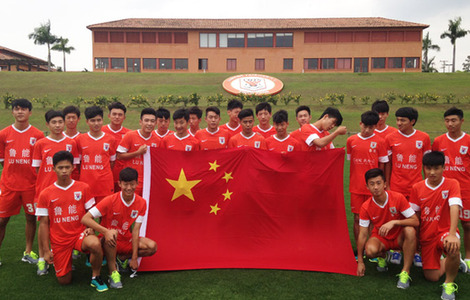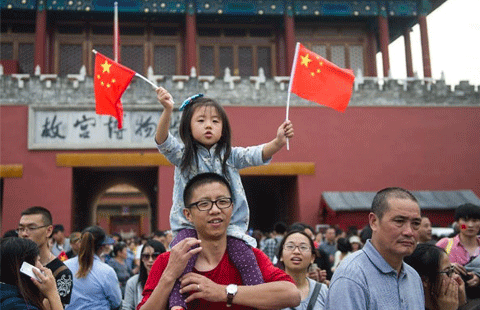Awareness of breast cancer symptoms lacking: Survey
Updated: 2014-10-03 00:55
By JACK FREIFELDER in New York(China Daily USA)
|
||||||||
People generally lack knowledge of the most common signs of breast cancer, according to a worldwide survey on awareness of the disease released on Thursday.
Less than half of 10,000-plus respondents polled said they were "confident" in naming the most common symptoms of breast cancer, such as a change in the size or shape of breasts and any lumps or pain in the surrounding areas.
Respondents in China were split evenly (50-50) on their ability to discern some telltale signs, but participants from the world's second-largest economy lacked knowledge about other important information about breast cancer, including its link to dense breast tissue.
GE Healthcare's global study —The Value of Knowing — was conducted and released in support of Breast Cancer Awareness Month (BCAM).
Breast cancer is the most common form of cancer afflicting women, with 1.7 million new cases diagnosed worldwide in 2012, according to the most recent data from Susan G Komen, the world's largest breast cancer organization.
Millward Brown, a New York-based global market-research firm, interviewed 1,000 people in 10 different countries on their knowledge of common signs of breast cancer during May and June. The survey also included a group of 250 women aged 40 to 70 and another group of 250 adults with relatives over the age of 65 from each participating country.
In addition to China, countries involved in the survey were Australia, Brazil, India, Indonesia, Japan, Russia, South Korea, the United States and the UK.
The study found that nearly three out of four people are unaware of the correlation between dense breast tissue and an increased likelihood for a woman's risk of developing cancer.
Women with dense breast tissue have four to five times higher risk of developing breast cancer, according to GEHealthcare, yet only one out of five respondents globally had seen, heard or read about dense breast tissue in the media during the last six months.
'Although the importance of breast cancer screening is well-known, this survey suggests that dense breast tissue, a relevant risk factor, is not widely understood,' said Jessie Jacob, chief medical officer of breast health for GE Healthcare.
Russian (60 percent), Indonesian (58) and Chinese (34) participants were among the respondents most aware of the dense breast tissue issue, while those in the US (19 percent), the UK (9) and Japan (2) were less informed.
Susan Brown, managing director of Health and Science Education for Susan G Komen, said Thursday in a press release: 'Pending legislation in the United States that requires doctors to inform their patients if they have dense breasts — and the related risks — will assist in the process of continuing to educate and empower women about their breast health.'
The occurrence of breast cancer diagnosis per 100,000 women among Asian-Americans is 84.7, somewhat less common than the incidence for African-Americans, 118.4, or Caucasian women, 127.3.
And the figures for breast cancer among women in China are much lower.
The rate of breast cancer among urban women in China is 40 per 100,000, and in the countryside 15 per 100,000, according to the latest statistics from the Ministry of Health.
In 2011, GE committed $1 billion to a five-year campaign against breast cancer, expanding cancer diagnostics, increasing imaging capabilities, and encouraging the development of various educational programs in healthy living and early detection of the disease.
jackfreifelder@chinadailyusa.com

 Chinese FM Wang Yi meets with Mexican president
Chinese FM Wang Yi meets with Mexican president
 Highlights at Paris auto show
Highlights at Paris auto show
 Upcoming month for in promoting Chinese films in Hollywood
Upcoming month for in promoting Chinese films in Hollywood
 HK urges end to 'Occupy' protests
HK urges end to 'Occupy' protests
 Young Chinese footballers learn from the best in Brazil
Young Chinese footballers learn from the best in Brazil
 Autumn fairy tales in China
Autumn fairy tales in China
 Scenic spots in Beijing packed with tourists
Scenic spots in Beijing packed with tourists
 Fruit and vegetable carnival fascinates tourists in Shanghai
Fruit and vegetable carnival fascinates tourists in Shanghai
Most Viewed
Editor's Picks

|

|

|

|

|

|
Today's Top News
19 arrested over clash in Hong Kong
Li's European tour aims pragmatic cooperation
Services growth hits 8-month low
Firmly safeguard rule of law in HK
Hong Kong chief calls for peace after clashes
Two Koreas to hold second round
of talks
Overseas experts laud Xi's remarks
US visas hinder talent search: expert
US Weekly

|

|







